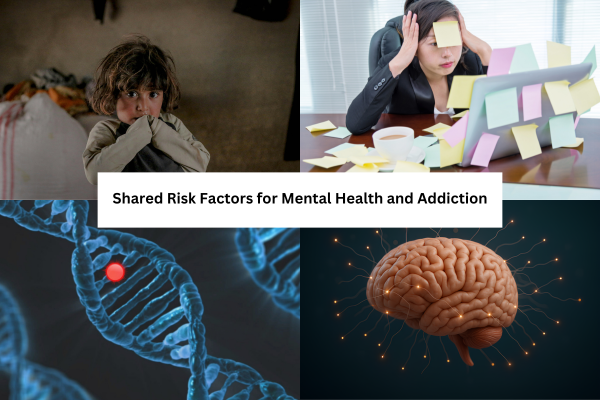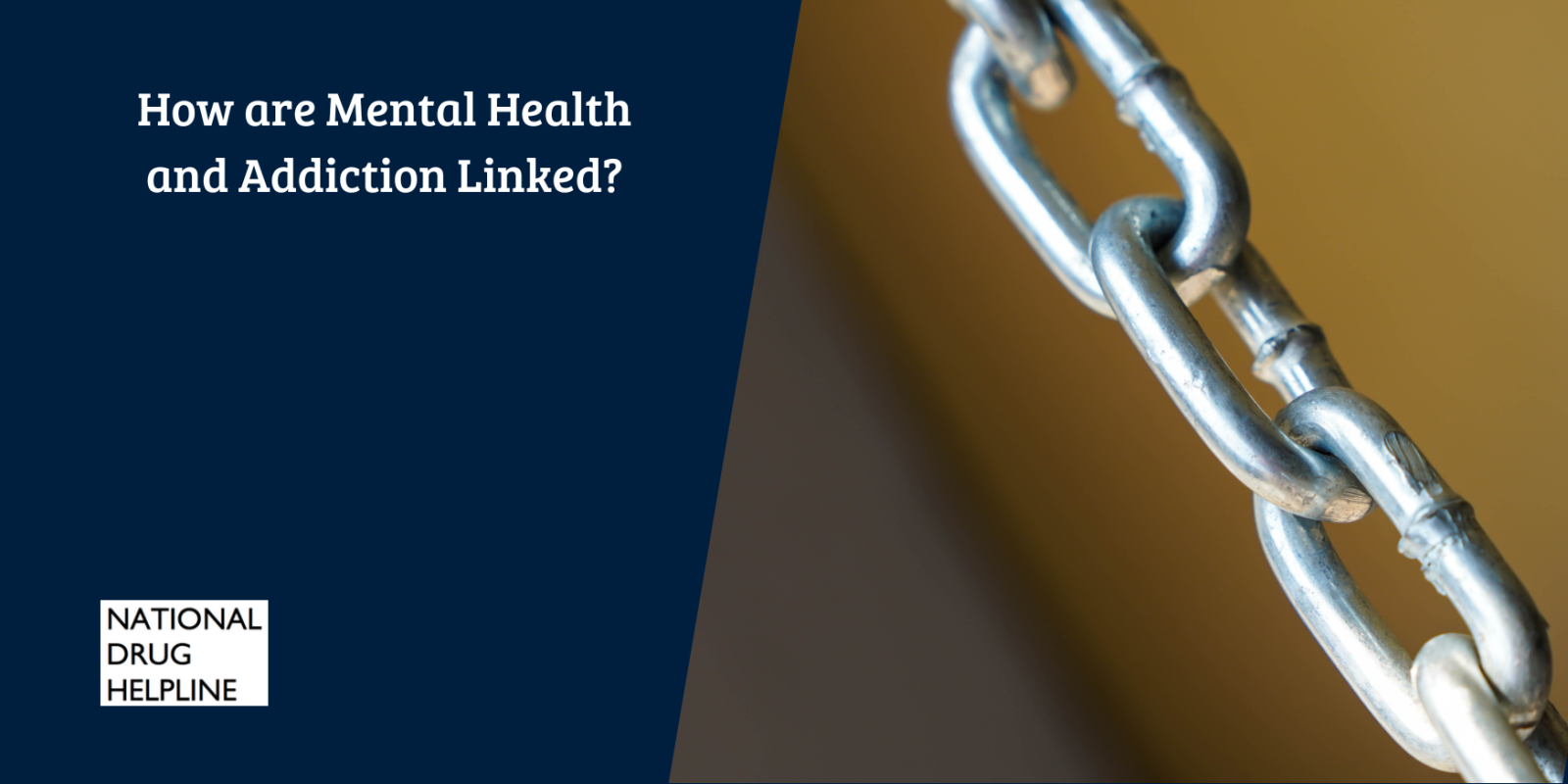Mental health and addiction are deeply related to each other and form a cycle that can be difficult to break. Most people with addiction also have other mental health issues, such as anxiety, depression, or post-traumatic stress disorder (PTSD). Likewise, people with pre-existing mental health conditions may also turn to addictive behaviors as a way to cope with these challenging issues. This overlap of mental health and addiction is known as co-occurring disorders or dual diagnosis. [1]
It is essential to properly understand the relationship between addiction and mental health, as both conditions need to be properly addressed for effective treatment. If they are not treated together, one issue may incite the other to recur again, which can create a cycle of relapse and poor health outcomes. In this article, we will look into how these conditions are linked together and why it is important to follow an integrated treatment plan.
The Overlap Between Mental Health and Addiction
Research has shown that there is a strong relationship between mental health issues and addiction. Research consistently shows a strong correlation between mental health issues and addiction.[2] Likewise, people with pre-existing mental health issues are more likely to develop a substance use disorder in comparison to the general population.
The overlap between two separate disorders is not a simple coincidence. It occurs because the brain regions that are involved in decision-making, reward, and stress response are similar for both mental health conditions and addiction. For example, imbalances in dopamine and serotonin regulation play a major role in both depression and substance dependence.
In people with such co-occurring disorders, neither condition should be viewed in isolation. For such cases, clinicians, families, and the affected person themselves must clearly understand the connection between these conditions to achieve long-term recovery.
How Mental Health Conditions Can Lead to Addiction
One of the most common reasons mental health conditions lead to addiction is self-medication. People who are dealing with overwhelming symptoms of depression, anxiety, or trauma may resort to taking alcohol or drugs to numb themselves. This can eventually become a habit that then gradually leads to addiction to such behaviors, with hopes of a temporary relief.
- Depression: If someone has a major depressive disorder, they may make drinking a regular habit to escape from any feelings of sadness or hopelessness.
- Anxiety Disorders: People with anxiety or panic disorders may take up sedatives or cannabis in order to calm their racing thoughts.
- Post-traumatic stress disorder: Survivors of traumatic events may turn to substances to quiet down any intrusive memories or nightmares that remind them of the event.
How Addiction Can Lead to Mental Health Issues
The relationship also works in reverse, meaning that addiction itself can trigger or worsen any existing mental health issues. Use of any addictive substance for prolonged periods can change the brain’s chemistry and lead to long-term mood disturbances.
- Alcohol: Heavy drinking can cause symptoms of depression, irritability, and even paranoia.
- Stimulants: While substances such as cocaine or meth may initially cause euphoria, they can lead to a crash period that often leaves users with severe depression and anxiety.
- Opioids: If someone with an addiction to painkillers or heroin suddenly stops taking them, it not only leads to physical symptoms of withdrawal but can also lead to mood swings and long-term depressive symptoms.
Shared Risk Factors for Mental Health and Addiction
The risk factors for both mental health conditions and addictions are very similar. Some shared risk factors are:

- Genetics: Family history plays a significant role in both conditions. Studies have shown that genetic factors increase the risk for both substance use disorders and many mental health disorders. [3]
- Environment: People with a history of exposure to trauma, neglect, or abuse or who had an unstable home life have increased vulnerability to both conditions.
- Early Development: Adolescents who have been exposed to substances or to significant stress during the period of critical brain development are more likely to face challenges with addiction and mental health later in life.
- Brain Chemistry: Imbalances in levels of key neurotransmitters such as dopamine, serotonin, or GABA pathways have been found in both mental health disorders and addiction. [4][5]
The Vicious Cycle of Co-Occurring Disorders
When mental health and addiction overlap with each other, they tend to further reinforce each other. For example:
- A person with depression may drink alcohol to cope, but the alcohol itself can worsen their mood and lead to more drinking.
- Someone with a known anxiety disorder may take stimulants for building their confidence, but when they stop taking the stimulant, they may go through acute panic attacks during withdrawal.
- People with PTSD may resort to smoking or taking cannabis to help them sleep better, but with time they may find that their symptoms have intensified when they try to stop.
If this cycle is left unbroken, it can lead to severe functional impairment and reduce the quality of life and even increase the risk of suicide. Therefore, if a dual diagnosis is present, it requires specialized care to properly disrupt this destructive pattern.
Why Integrated Treatment Is Essential
Until recently, mental health issues and addiction were taken as separate conditions requiring different treatments. This would often leave individuals with fragmented care. But recent evidence now supports integrated treatment models, which address both issues at the same time.
The main features of integrated treatment include:
- Comprehensive assessment: During the initial assessment, every person should be clinically assessed for both mental health and substance use disorders.
- Combined Therapy: A combination approach should be taken to tackle both issues. Such an approach may include cognitive-behavioral therapy (CBT) and dialectical behavior therapy (DBT).
- Medical Management: Medications such as antidepressants, anti-anxiety medication, or mood stabilizers should be prescribed with caution. They should be used carefully when they are being taken alongside addiction treatment medications like buprenorphine or naltrexone.
- Peer Support Groups: People with dual disorders can opt for dual recovery programs that are targeted specifically for people with co-occurring disorders.
Conclusion
Mental health and addiction are interrelated conditions that often exist in a reinforcing cycle that can be difficult to escape. Regardless of which condition precedes the other or if both arise from shared risk factors, the end result is often the same. It is challenging to treat people with dual disorders without a proper comprehensive approach.
But recent integrated approaches that address both mental health and addiction simultaneously offer the best path towards long-term recovery. By breaking any stigma, promoting accessible health care, and understanding the link between addiction and mental health, even people with co-existing mental health conditions and addiction can lead healthy fulfilling lives.
References
| ↑1 | Horsfall, Jan, et al. “Psychosocial treatments for people with co-occurring severe mental illnesses and substance use disorders (dual diagnosis): A review of empirical evidence.” Harvard review of psychiatry 17.1 (2009): 24-34. |
|---|---|
| ↑2 | Flynn, Patrick M., and Barry S. Brown. “Co-occurring disorders in substance abuse treatment: Issues and prospects.” Journal of substance abuse treatment 34.1 (2008): 36-47. |
| ↑3 | Szerman, Néstor, et al. “Dual disorders: addiction and other mental disorders. Integrating mental health.” Advances in psychiatry. Cham: Springer International Publishing, 2018. 109-127. |
| ↑4 | Samaripour, Hayat. “Neurotransmitters and mental health: understanding the chemical underpinnings of psychological disorders.” International Journal of New Chemistry 12.4 (2025): 825-841. |
| ↑5 | Tomkins, Denise M., and Edward M. Sellers. “Addiction and the brain: the role of neurotransmitters in the cause and treatment of drug dependence.” Cmaj 164.6 (2001): 817-821. |

